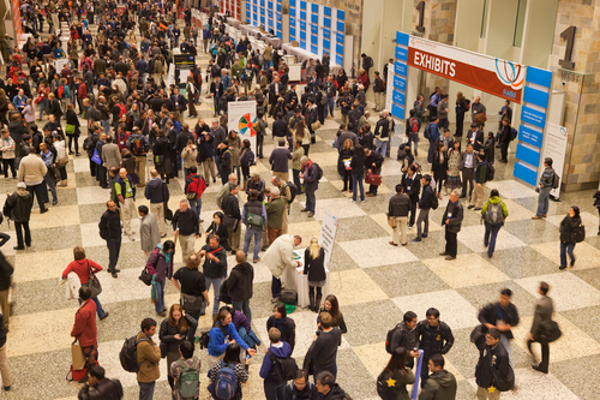The phrase publish or perish is well known in the academic world. It applies not only to professors and researchers, but also to graduate students who want to get recognized for their contribution. Presenting a paper at an academic or research conference is considered a form of publication. You are disseminating knowledge and adding another entry to your CV, which will increase your future options when looking for a new position. However, you do not necessarily need to be presenting to attend a conference — being a co-author of a paper or a poster can give you some recognition too and potentially launch you into the field.
It is essential to employ a proactive approach and make your time at a conference count. Here are some tips to make your attendance as fruitful as possible:
- Don’t focus just on the big names
Conferences are a great opportunity to meet people and familiarize yourself with the ins-and-outs of your field, including finding out about norms, conventions and politics. Graduate students are often keen to meet some ‘big names’ and win their attention. However, this is not always feasible. You might be wasting your time trying to engage with a famous researcher who is already busy interacting with others. It might be more worthwhile to chat with other students, especially Ph.D students and/or postdocs. They will most likely be co-authors of the papers and/or posters their supervisor is presenting at the conference, and they are much more accessible. Students are generally easier to chat with and might even be willing to make an introduction for you, introducing you to their supervisor at some point.
- Take time to listen and engage with people
This tip applies especially to those of you with poster presentations. It is a good idea to spend time next to your poster, so you can engage with people who drop-by to see it. Have summaries of your work printed out, so those who are interested can take it away and contact you later. Also, attend other people’s posters and presentations and be proactive when discussing research topics with others. Researcher presenters before attending the event to maximize your time.
- Arrange potential meetings before the conference
If you are hoping to meet particular individuals, it is best to contact him or her via before the conference. You cannot expect that you will simply bump into them and they will have time to attend to you. Better to arrange a convenient time beforehand. Do not be shy about making contact. Supervisors and researchers are usually responsive when approached by e-mail and they will likely provide you with a reply that can guide your future interactions.
- Spend time with people you don’t already know
Graduate and undergraduate students often attend conferences with other students from their department. Two students may even share accommodation to save money, making the experience more economical and fun. This can of course be very beneficial, however, it should not limit you in making new acquaintances. Remember that you are at a conference to meet people you do not already know. This might sometimes be anxiety provoking and will mean stepping out of your comfort zone. But, in the long run, it will help you broaden your research network and make you more comfortable socializing with a wide variety of people. So, when going for lunch, use it as an opportunity to meet someone new whenever possible.
- Rekindle your connections from previous conferences
It is likely that you will meet people you had previously met on similar occasions. Researches and students from a certain field tend to attend the same conferences. Take time for your old acquaintances and catch-up with them to strengthen professional bonds. It’s always exciting to hear how somebody’s project is coming along or to get some news from other departments and universities.
- Wear your name tag
If you are given a nametag by the event’s organizers, make sure to wear it. Also, wear it in a safe and obvious place, such as clipped to your shirt, so people can easily read it. It can be very frustrating to meet someone you might have met previously and not be able to recollect their name. By wearing a name tag you can increase your chances of positive interactions, as well as avoid awkward social situations.
How to Pick a Good Conference for You?
Conferences can be regional, national or international. Likely, you are already familiar with some of the good conferences in your field, and if you already have a supervisor this person can be a great source of information as well. Often, he or she will encourage you to attend a certain conference or will bring you along to one they are already attending.
Although world conferences and/or congresses (e.g. World Congress of Audiology) are usually well attended, they are not necessarily of a higher quality than some regional congresses. World congresses tend to represent all parts of the world, whereas regional ones can sometimes be more selective and employ higher standards when reviewing submitted abstracts.
Lastly, do not postpone attending a senior academic conference. The sooner you do it, the better. It will give you a wealth of experience that cannot compare to theoretical work. So set your fears and doubts aside and submit early. The worst that can happen is you do not get accepted.
